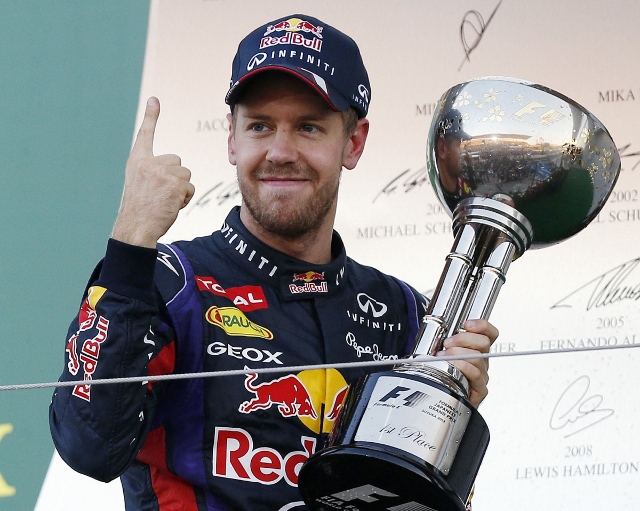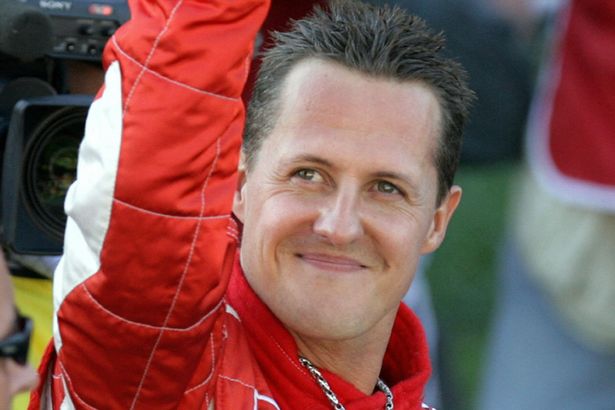Conor Walsh | Contributing Writer
The 2013 Indian Grand Prix saw Sebastian Vettel join a select group of drivers, when he claimed his fourth consecutive Formula One World Championship. His dominance then continued the following week in Abu Dhabi, where he won his eleventh race of the season. The performances he has shown over the last eight months have got racing commentators the world over asking the same question: is Seb one of the greatest champions to have graced the arena of F1? For me, the answer is no.
It is a difficult task to try and classify greatness. Many factors need to be considered first and foremost; the number of world championships, race victories and pole positions are the usual starting points but, where F1 is concerned, the idea of a driver being talented, exciting and charismatic are just as important as the statistics. It is, yet again, even more difficult when you consider the ever changing technological landscape and culture of the sport.
To consider Vettel in the pantheon of F1 greats, I have to compare him to the likes of Juan Manuel Fangio (five championships), Jackie Stewart, Niki Lauda, Ayrton Senna (three each), Alain Prost (four) and, more recently, Michael Schumacher (seven) and Fernando Alonso (two). There can be no disputing their places on the list of the greatest F1 drivers to skim the asphalt. Fangio, Stewart and even Lauda come from a bygone era which placed reckless abandon in the corners on top of the list of priorities of tyres, engine and suspension. The sheer disregard for their own safety that they showed, while driving what can only be described as 900 BHP death-traps, led to a style of racing that favoured attack over defence, and thus led to more challenging Grands Prix with less uniform in the way results fell. Consequently, it was quite an achievement in the heyday of the 60’s and 70’s to win one World Championship, let alone three or four.
Comparing this to the modern day then, we know that Vettel enjoys a greater amount of safety than his predecessors, with fireproof uniforms and carbon fibre chassis being standard issue for each team. However, he also is fortunate enough to be employed by the richest team on the circuit, Red Bull, with a technical backroom team consisting of Christian Horner and Adrian Newey that have produced the fastest car on the paddock for the last four years, certainly in terms of power and aerodynamics.
The seemingly bottomless pit of finance at Red Bull added to the design genius of Newey and the tactical mastery of Horner means that Vettel is practically at a head-start for every race he competes in. For the last four years he has simply needed to turn up to a race, hope for dry weather, secure pole and cruise to victory. His main task then seems to be less about racing and more about maintenance of his tyres and engine – hardly champion attributes to write home about.
That’s not to take away from Vettel as a driver; you don’t win four World Championships by being mediocre. He’s a good driver, but when we examine the performances of Vettel among other great champions there are key elements which he lacks to being considered a ‘great’ champion.
In one instance, he has never come close to the superiority shown by his fellow countryman Michael Schumacher in his handling of wet conditions. His best performance in this regard – Monza in 2008 – pales in comparison to some of Schumi’s finest drives in the wet: Suzuka (2000) and Sepang (2001) are just two noteworthy mentions. The hallmark of a great champion is versatility: Stewart, Lauda and were just as accomplished on the wet, green hills of Spa and the Nurburgring as they were on the bone-dry expanses of Kyalami in South Africa.
If we contrast the situation of Vettel with other drivers on the circuit today, you start to see more of what I mean. Alonso, driving for a Ferrari team which is a shadow of its former glorious self, has for the last two years single-handedly kept the Maranello outfit’s fortunes alive with some blistering performances, and last year nearly did the unthinkable and snatch the world title from Vettel. The Spaniard has shown the hallmarks of a true champion these past years; hunger, endeavour, attacking intent combined with charisma off-track that can see him comfortably placed in the hall of great champions. Even Kimi Raikkonen, with just one world title to his name, has shown us this year why he would be deserving of such as status, what with his string of podium finishes and current third placing in the Drivers’ Championship all achieved in a car which, by all accounts, has no right to be in the place it is currently in.
Aside from that however, it essentially seems just a little bit early to consider Vettel a great champion just yet. It may potentially mean him winning three more titles as per Schumacher, breaking every record on the way, or he may grind his way to another championship with an inferior car to his competitors – although the likelihood of this is slim. Either way it is unfortunate for him that the sheer advantage he enjoys before the wheels turn on his car for every race means that as things stand he falls short of that elusive branding of ‘great champion’, which so few of his peers have achieved.








